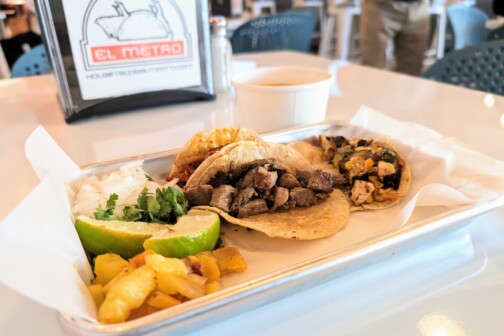“O oooooooooweeeee ” It is the cry of an unknown creature in a night-dark I I jungle. Or of a grown woman terrified by a half-thawed, headless chicken. “No! No! No! Get that thing away from me. It’s naaaaasty!”
For Marie Facion. the hen carcass sitting in front of her is an object of horror mixed with disgust. Despite the fact thai she’s changed plenty of dirty diapers while raising her two children. Marie is nervous about her first confrontation with a dead, edible animal.
“When we want chicken, we go to Church’s;,” she explains. “My babies mostly like McDonald’s or pizza. I ain’t cuttin’ up no chicken.”
Despite her squeamishness, Marie, along with a handful of other low-income mothers, is taking a class to learn how to prepare simple, inexpensive, and nutritious meals. The class is part of an ongoing series called Operation Frontline, developed and directed by the North Texas Food Bank.
The program attracts big name chefs willing to donate their time to leaching the basics of cooking-Stephan Pyles of AquaKnox and Star Canyon; Chris Svalesen, formerly of Fish; Chris Huff of Palomino; and Sambuca’s Pete Nolasco, just to name-drop a few. Each instructor is paired with a professional nutritionist and a volunteer from the Junior League.
“You can do this.” encourages Andrea Pratt, executive chef for Zale Lipshy University Hospital in Dallas, as she dissects a demonstration chicken with a few deft strokes. “You can save a lot of money by cutting up a whole chicken instead of buying just the pieces. This certainly is a lot cheaper and a lot better for you than eating fast food.”
Marie’s group spreads across a couple of long, folding tables in a meeting room in the community center of the Hillburn Hills Apartments, a low-income housing development in Pleasant Grove. Some of their children play in a day care center upstairs. Two older youngsters study at a computer set up in the main room for the use of Hillburn Hills residents.
Several of the women live in the nearby apartments, but others have traveled by bus to get here. They are making a big effort because they want to improve the quality of the food they prepare for their family.
I said to my husband, ’We have to change our lives so our little ones don’t have the same problems that we have,’” says Rosa Sanchez, a 41 -year-old mother of three daughters, ranging in age from eight to 19. “We used to eat bread, six or seven tortillas, with every meal. Now we don’t. I don’t buy no Coke no more. Now we drink water.”
Rosa absorbs every detail and takes serious notes on the tips that some people have paid hundreds of dollars to learn. With her knife she carefully carves her chicken and chops carrots on the bias. Thoughtfully, she tastes each herb that will go into the evening’s recipe-a one-dish meal called Herb-Roasted Chicken with Vegetables-to discover the unique flavors of oregano, rosemary, and dried basil.
After each student has finished mutilating her prey, Chef Pratt talks her class through the rest of the recipe. It’s a party atmosphere and it’s hard to tell who has the most fun- the chefs or the students. Some of these culinary masters haven’t spent much time lately preaching the basics of cooking. They jump at the chance to answer simpler questions than “Should I use Italian or Greek olive oil?” or “Are those shiitake or cremi-ni?” when discussing food preparation.
The oven door finally closes, and for the next 40 minutes, the pupils play party games with nutritionist Karen Geismar, a registered dietician at Parkland Hospital, as the emcee. It’s a healthy version of What’s My Line? as she humorously prods students to select the healthiest product on a nutrition label. She talks about food measurement (a challenge to any cook when you find a recipe that calls for something in grams) and how to pick products that deliver the best value.
The timer goes off and each participant piles her plate with her creation. The ohs and ahs from the cooks reveal the true spirit of the evening. Everyone enjoys a good meal and whenever you bring people together and cook, it’s always a party. When the dishes are done tonight, each student will receive a bag of groceries containing all ingredients needed to make the same dish for her family.
“This is one more way for the North Texas Food Bank to place food into the homes of people who need it,” says Robin Plotkin, who heads Operation Frontline for the food bank. “A lot of people won’t accept our food as charity, but when they receive it as part of a class like [his, they feel better about it.” Maybe because it seems more like a party favor than a handout.
ELENA GOMEZ EYES THE LONG PRODUCE counters in a Pleasant Grove supermarket with great uncertainty. Though she has lived in this country for a dozen years, she still feels overwhelmed at the choices available in American grocery stores. Growing up in Russia, she never had so many selections and isn’t familiar with some of the weird-looking green things piled neatly under the misting spouts.
A head of romaine lettuce catches Elena’s eye. She picks it up. thinking it’sa leafy green, like spinach, that she can cook as a vegetable. Only when a classmate explains that romaine usually is considered a salad green does she drop it back into the produce bin.
For Operation Frontline students, a field trip to a local supermarket is the first step toward putting into practice the principles they have learned in the classroom. Tonight, Robin Plotkin presents a challenge: “Your job is to buy enough food to prepare two main meals and a snack for your entire family without spending more than $10.”
The women take the grocery derby challenge and scurry off to fill their carts. Pratt and Geismar roam the aisles to answer questions and offer advice. Plotkin takes advantage of the 45 minutes the students have to shop by talking about the North Texas Food Bank and Operation Frontline.
Share Our Strength (SOS), an umbrella organization of food banks around the country, started the program in Washington, D.C., in 1993, Plotkin recalls. It was so successful in helping low income families make the most of their food dollars that it quickly spread to other cities.
Dallas chef Stephan Pyles, a member of the SOS board of directors and a lifetime North Texas Food Bank board member, saw the success of Operation Frontline in other cities and urged the local organization to adopt the idea. Classes here began in the fall of 19%. Pyles was the first instructor. The partnership between NDFB and SOS has become a model for other cities. The marriage of the national organization and a local entity ensures that the program suits the particular community. Operation Frontline may not be broadly effective-it directly touches only a few hundred people a year- but it is deeply effective.
Since then, about 400 heads of low-income households, men as well as women, have completed classes in Irving, Oak Cliff, Lancaster, North Dallas, and Dallas area. North Texas Food Bank has added programs to help HIV and AIDS victims meet their special dietary needs. A new series of classes teaches children about how foods that are good for them can taste great, too.
“If you look at the numbers, we probably don’t reach a huge amount of people with this program,” says Plotkin. “But if you look at what a difference something like this can make in people’s lives, we think the impact can be huge. We can’t end poverty, but we can make a big dent in malnutrition in our part of Texas.”
Operation Frontline does make a difference in the lives of its graduates and their families. The Food Bank periodically brings former students back together for follow-up evaluations. About three-fourths of those students report that they continue to practice the principles and techniques that they learned in class, even after the glow of graduation wears off.
As Plotkin explains the mission of the North Texas Food Bank-to collect food from donors and distribute it to client agencies that work directly with low-income families in their communities-the eager contestants make their way to the finish line. Carls are bulging with meat, vegetables, and snacks that, they hope, will ring in under the limit.
Lights! Camera! Action! Rosa Sanchez lakes the blue ribbon as the most efficient shopper. For $9.86 she has selected enough groceries to make two dinners, a lunch, a breakfast, and several snacks for her family of five. You can barely get a cheeseburger, fries, and a drink at a restaurant for that. Her items include a gallon of whole milk, a package of old-fashioned oats, a package of Jello, a bunch of bananas, one pound of rice and another of pinto beans, a pound and a half of ground round, three roma tomatoes; six jalapenos, one yam, one onion, and a bunch of cilantro.
“I have to buy rice and beans because my husband and me come from Mexico, and we like the foods we ate at home,” Rosa says. “But I have learned to make them much better. I used to think you had to put lard in beans and fry the rice in oil before you cooked it. Because of what 1 have learned in these classes, I don’t use so much fat no more. I cook rice without oil, and my husband, he likes it just as good.”
Rosa adds, “The Jello will make a snack for the kids. I can make the yam into a snack for my husband and me.”
THE HERB-ROASTED CHICKEN IS DELICIOUS. Everybody says so. And Rosa Sanchez beams with pride at their compliments.
“I never cooked food like this before,” says Rosa. “I’ve always cooked traditional Mexican dishes, with lots of starches and lots of fat. This is good, It’s a lot healthier for my family than the food we’re used to. I have learned so much in six weeks.”
It is graduation night for the Operation Frontline class at Hillbum Hills community center. Of the 15 women who started the class six weeks ago, only five remain. Tonight, each of the five contributes a dish for the group to enjoy in a potluck graduation banquet.
Rosa’s herb-roasted chicken-an exact recreation of the meal that Chef Pratt demonstrated several weeks ago-is the centerpiece. Marie, who still has a bit of a phobia about meat, contributes a fruit salad. Elena Gomez prepares a beet salad that combines principles she has learned in class with a Russian twist.
Sampling the spread, it’s evident thai there is more than food preparation that is being learned. Nutritionist Karen Geismar hands out paper cutouts of foods for one last food group challenge. No dessert for those who can’t decide if bread is a grain or if refried beans are considered a meat or fruit. Pop quiz: How many servings of each would satisfy a day’s requirement for that food group?
Testimonials follow dinner, and the students share what they’ve learned and how they predict their lives will change. Rosa’s life is already different. “I have lost 30 pounds in the past few months,” says Rosa. “My husband has lost 37. It’s just because of eating better and going to the gym. This is tile first time I have ever lost weight in my life. I feel good.”
Robin Plotkin calls each woman to the front of the room and hands each a diploma, a non-stick skillet, and a year’s supply of herbs and spices. As we leave the community center, I compliment Marie on her fruit salad and ask how her family liked her version of herb-roasted chicken and vegetables.
“I done told you,” she answers. “I ain’t cuttin’up no chicken.”
Related Articles

Hockey
The Stars and Golden Knights Meet Again
Catching the Stanley Cup champs early might work out for the Stars.
By Sean Shapiro

Basketball
Previewing Yet Another Mavs-Clippers Playoff Matchup
What is different about Clippers-Mavericks this time around? Kyrie and D.
By Iztok Franko

Restaurant Openings and Closings
Try the Whole Roast Pig at This Mexico City-Inspired New Taco Spot
Its founders may have a fine-dining pedigree working for Julian Barsotti, but Tacos El Metro is a casual spot with tacos, tortas, and killer beans.


